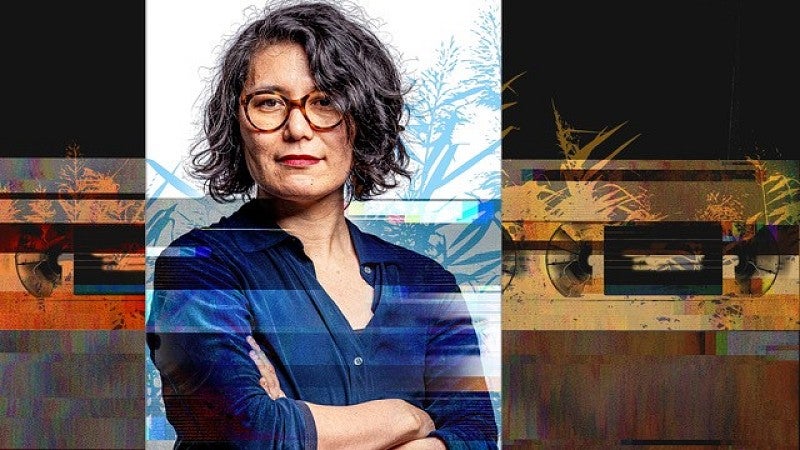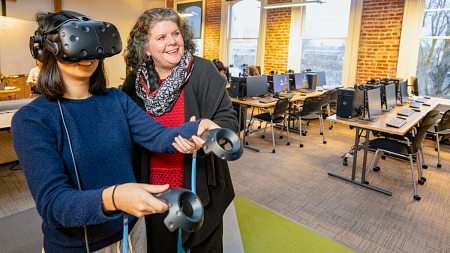
Lessons from Sundance: Filmmaker Masami Kawai Finds Her Footing
The cinema studies professor brings the inspiration of Robert Redford’s movie institute to the classroom
By Matt Cooper • Illustration by David Gill • January 17, 2024
3 min read
Like any movie director, Masami Kawai must manage her film crew’s temperament during long hours on the set. A happy film crew is a productive film crew, after all.
But she recently received sage advice at a movie institute founded by the great Robert Redford: nothing—and no one—comes before the story itself, she was told—think of it like it’s your baby. This prompted a review of her priorities as a filmmaker.
“As a mom of a toddler, putting my child first is instinctual. So prioritizing my story, like my baby, helps me better navigate the pressures of a set,” says Kawai, an assistant cinema studies professor in the College of Arts and Sciences. “[The film crew] can have unpleasant looks on their faces while they’re working. They’re bored, they want to be on their phones. But it can’t be my priority to make them feel better. My number one priority is the story and my actors.”
Kawai gained the insight last spring at the Sundance Institute in Utah. She was among those selected for a two-week workshop during which, under the eye of talents such as actor Ed Harris, a four-time Academy Award nominee, filmmakers rehearsed, shot, and edited scenes from working projects. “You feel his charisma, you are drawn to look at him,” Kawai says. “He’s got so much energy and he’s wonderful. He’s just himself.”
The Sundance experience is energizing both her work as an independent director-writer-producer and her instruction to University of Oregon undergraduates on the art of moviemaking.
Says Kawai: “I will always hold onto the generosity, creativity, and love of cinema that Sundance gave us.”
A term’s worth of work for two minutes
During Introduction to Narrative Production, a course Kawai teaches, cinema studies majors learn all aspects of film production and produce two-minute movies. Resources are limited so the films are typically shot in Knight Library or outside. But that hasn’t hindered student creativity.
The movies are sometimes lighthearted and often imbued with the students’ personalities. In one, a young woman is upset with her friend, prodding him for explanations, Kawai says, “why men always think about the Roman Empire, why they always think about war.” He admits he thinks about the Roman Empire—but only togas.
“It’s a critique of both war and masculinity in two minutes,” Kawai says. “That’s pretty impressive.”
Vignettes that evoke emotions, starring mom
Kawai, a descendant of the Ryukyuan people who live on islands between Japan and Taiwan, has won “best narrative short” awards for films that capture life’s evocative moments—struggle, connection, loss. In one, an old immigrant woman played by her mother, Kana, braves a drought-stricken Los Angeles in search of water for a neighbor in need.
“She’s an actor, she’s willing to take on anything and try things,” Kawai says. “These are twelve-hour days, so to spend them with people you love is the best.”
In ‘Valley,’ finding a gem worth giving her all
Kawai’s next project is her first feature-length film: Valley of the Tall Grass, which depicts stories of working-class Indigenous people who come across a discarded TV/VCR set. Shooting begins next summer.
“It’s all systems go,” Kawai says. “You want to find a story that you’re passionate about, that you’re willing to work really hard for. I found the one.”
Want to celebrate a Mighty Woman of the University of Oregon? Send us your submission before Women’s History Month in March.
Matt Cooper is managing editor for Oregon Quarterly.




